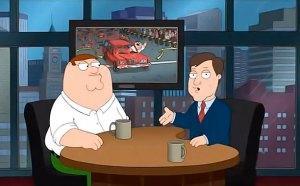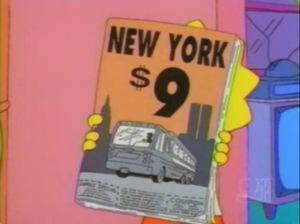
As I watched last night’s Family Guy, my local Chicago station’s news teaser informed me of an unfolding tragedy to our West. Tornadoes were hitting parts of the Midwest and they were heading our way. As the second episode began, one character, Stewie, requested that they watch The Weather Channel because, “there are tornadoes in the Midwest and I like watching poor people scramble to save what little they have.” For those who didn’t initially notice it, the presence of an onscreen weather warning made the juxtaposition explicit.
This was not the first instance of Family Guy inadvertently finding extra sickness as their jokes took on new substance in relation to current events. The March 17 episode, “Turban Cowboy,” showed a character, Peter, drunk-driving his way through a crowd of runners to win the Boston Marathon. Later in the same episode, Peter unwittingly becomes involved with a terrorist organization, which leads to a gag in which he repeatedly, albeit accidentally, detonates bombs with his cell phone. After the attacks at the Boston Marathon less than a month later, these clips gained a lot of traction on the internet and Fox pulled the episode from its official internet sites and, at least for now, from future airing as reruns.
Over at Splitsider, Joshua Kurp lists similar situations in response to 9/11 with episodes of The Simpsons, Rocko’s Modern Life, Sex and the City, Friends, Married. . .With Children, and Spongebob Squarepants.

In these cases, where jokes get cut or entire episodes disappear from reruns, we witness a fascinating indicator of humor and television’s temporality in relation to more serious events in the “real world.” The inadvertent nature of these juxtapositions create a kind of dramatic irony that adds an extra element of humor to these episodes. But they also indicate interesting changes in what is considered to be acceptable discourse. Kurp’s article claims – and DVD commentary by writers backs him up – that many syndication markets pulled the 1997 Simpsons episode in which Homer visits New York and has a particularly hard time in the shadows of the Twin Towers. Even after its return, at least one joke remains edited for the sake of sensitivity. One man informs Homer that, “They put all the jerks in Tower One.” Entirely inoffensive in its original context, the concept that any “jerks” (aside from the hijackers) might have died on 9/11 has apparently become unfathomable. Of course, to say it out loud makes that idea sound ludicrous, but the construct that dichotomizes cowards and heroes in the wake of such events is a powerful tool of both psychological comfort and ideological reinforcement. That a joke made to the contrary – even one made in 1997 – cannot question that logic is apparently too radical for syndication.
For humor and media scholars, these prove especially interesting cases for thinking about the temporality of both. While often theorized as an essentially live medium, television in these cases seems to straddle a line between past-ness and present-ness as it shows documents from the past, but edits appear to deny their status as historical documents. The same might be argued of racist, sexist, or any other troubling -ist humor in other texts, but these are not judgments based on universal ethical or moral values. Instead, they reflect a fundamentally ahistorical reading of television comedy in relation to privileged instances of ideology.
